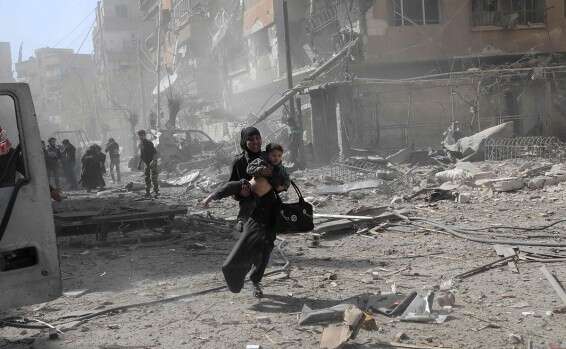The Pentagon said on Thursday that while there were no signs the Syrian government was preparing to launch a chemical weapons attack, President Bashar Assad still retained the ability to launch limited attacks.
U.S. assessments following the U.S., British and French joint missile strikes on Syria last weekend show they had only a limited impact on Assad's ability to carry out chemical weapons attacks.
"They do retain a residual capability. It is probably spread throughout the country at a variety of sites," said Lt. Gen. General Kenneth McKenzie, joint staff director.
"They will have the ability to conduct limited attacks in the future, I would not rule that out," McKenzie said during a Pentagon briefing.
The United States, France and Britain destroyed three targets tied to Syria's weapons program. The most important of them was the Barzah Research and Development Center, which U.S. intelligence concluded was involved in the production and testing of chemical and biological warfare technology.
Syria and Russia deny unleashing poison gas on April 7 during their offensive on Douma, which ended with the recapture of the town that had been the last rebel stronghold near the capital, Damascus. The suspected attack triggered the U.S. response.
McKenzie said that the "absolute preponderance of the evidence" pointed to chemical weapons being present at the sites that were struck, including elements of sarin, particularly at the Barzah site.
He added that while the United States could not know with certainty, there was no evidence that any chemicals had escaped into the air after the strike.
Also on Thursday, the State Department said the United States has credible information that Russia and Syria are trying to "sanitize" the site of the Douma chemical weapons attack while denying access to the area by international inspectors.
Department spokeswoman Heather Nauert said the team of inspectors from the Organization for the Prohibition of Chemical Weapons had not been given access to the site of the attack.
"We have credible information that indicates that Russian officials are working with the Syrian regime to deny and to delay these inspectors from gaining access to Douma," Nauert told a news briefing.
"Russian officials have worked with the Syrian regime, we believe, to sanitize the locations of the suspected attacks and remove incriminating evidence of chemical weapons use," she added.
While repeating that Syria was responsible for the attacks, Nauert also said the United States had credible information that "people on the ground have been pressured by both Russia and Syria to try to change their stories."
A U.N. security team came under fire in Syria on Wednesday while doing reconnaissance for inspectors to visit the sites of the suspected attack.
Nauert said the United States worried that the evidence would "deteriorate" the longer the inspectors were delayed. "That is of great concern to us," she said.




